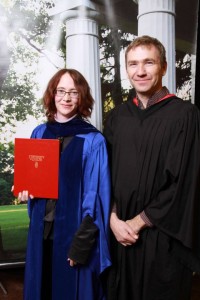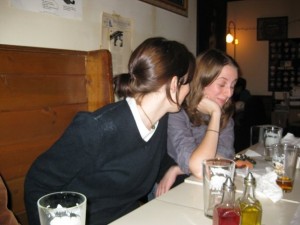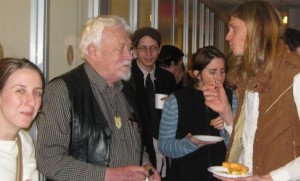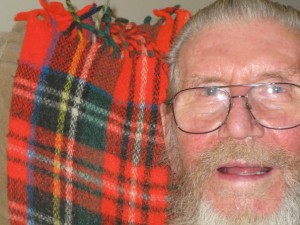 We don’t just live in our minds. We also don’t just live in a world with other people. We live with the need to have the world in our mind fit with the world of other people, and the shape our life takes is determined by how these two mesh.
We don’t just live in our minds. We also don’t just live in a world with other people. We live with the need to have the world in our mind fit with the world of other people, and the shape our life takes is determined by how these two mesh.
At one level, this need to intergrate our subjective perception with the perceptions of others involves having our “factual” view about the world accord with the views others have of the facts. The sense that we inhabit the same “real” world establishes a norm to which our personal views must answer, and the perspectives others have (especially others who have devoted careful attention to gathering and analyzing the evidence) thus offer a “check” on our opinions.
At another, ultimately more intimate level, the need for the integration of perspectives means having our sense of ourselves accord with the views others have of us.
 In any given encounter, it is possible to interact smoothly with another who thinks of you differently from the way you think of yourself. It may be irritating, for example, to go to a restaurant or bar where you are a “regular,” and be treated by a newly hired server as a stranger to the place. But many of us (not all!) can brush off such a slight, especially because we know that, in a short time, the server’s perspective will be corrected as she or he comes to learn from others of our long involvement with the place. Or, again, it may be amusing to be lectured to by someone with far less experience in a matter with respect to which you are
In any given encounter, it is possible to interact smoothly with another who thinks of you differently from the way you think of yourself. It may be irritating, for example, to go to a restaurant or bar where you are a “regular,” and be treated by a newly hired server as a stranger to the place. But many of us (not all!) can brush off such a slight, especially because we know that, in a short time, the server’s perspective will be corrected as she or he comes to learn from others of our long involvement with the place. Or, again, it may be amusing to be lectured to by someone with far less experience in a matter with respect to which you are  an expert, especially if you will soon return to a world where your expertise is recognized such that your sense of yourself is not significantly threatened by this minor case of misapprehension. Finally, such a situation of misrecognition can even be strategic, that is, you might rely on being misunderstood so that you can subsequently win praise through revealing your unrecognized greatness. I have a friend who used to do just that: at a young age, he had sailed both across the equator and through the arctic circle, thereby earning the privilege of resting both of his elbows upon the dinner table while at sea; he would regularly put his elbows on the table nonchalantly, counting upon being challenged by an older sailor who would presume from his youth that he had not earned the right to do so, only so that he could have the pleasure of proving that sailor wrong.
an expert, especially if you will soon return to a world where your expertise is recognized such that your sense of yourself is not significantly threatened by this minor case of misapprehension. Finally, such a situation of misrecognition can even be strategic, that is, you might rely on being misunderstood so that you can subsequently win praise through revealing your unrecognized greatness. I have a friend who used to do just that: at a young age, he had sailed both across the equator and through the arctic circle, thereby earning the privilege of resting both of his elbows upon the dinner table while at sea; he would regularly put his elbows on the table nonchalantly, counting upon being challenged by an older sailor who would presume from his youth that he had not earned the right to do so, only so that he could have the pleasure of proving that sailor wrong.
Reading Plato’s Apology of Socrates, however, is a good reminder that not all such situations of misrecognition are so easy to accommodate.
At the age of 70, Socrates was accused of impiety and of corrupting the youth of Athens. Those who accused him and most of those who tried him were significantly younger than he was; they were not there when, as a young man, he spoke with Parmenides and Zeno, or when he learned the art of love from Diotima, or when he  returned to Athens from a long absence and spoke with the young Charmides. Indeed, a number of Plato’s writings that portray Socrates in dialogue with others are framed by the conversations of the individuals who are relaying the dialogue, and those followers, like the jurors at his trial, are also often at a great distance from the original conversation, reporting on something long past that they have only heard about from others. Both at his trial and with his later followers, Socrates exists primarily as a reputation that he has acquired in the eyes of others–a reputation that may be quite at odds with the identity he actually lived through in the events of his life. It is hard not to think that both his accusers and many of his followers significantly misrecognized him; in the case of his trial, that misrecognition cost him his life.
returned to Athens from a long absence and spoke with the young Charmides. Indeed, a number of Plato’s writings that portray Socrates in dialogue with others are framed by the conversations of the individuals who are relaying the dialogue, and those followers, like the jurors at his trial, are also often at a great distance from the original conversation, reporting on something long past that they have only heard about from others. Both at his trial and with his later followers, Socrates exists primarily as a reputation that he has acquired in the eyes of others–a reputation that may be quite at odds with the identity he actually lived through in the events of his life. It is hard not to think that both his accusers and many of his followers significantly misrecognized him; in the case of his trial, that misrecognition cost him his life.
 Most of us will not be tried in court at the age of 70 and forced to justify our lives to the younger generation. But it seems to be nearly a necessity that with age will come misrecognition. Your children will not know you as the “life of the party” that you were when you were 25. Since no one turns to you now for help, no one will recognize how much you know about mechanics, finance, or medicine. Though for you your love affairs were many and meaningful, no one around you even knows of the existence of your former partners, let alone of your passionate, erotic style.
Most of us will not be tried in court at the age of 70 and forced to justify our lives to the younger generation. But it seems to be nearly a necessity that with age will come misrecognition. Your children will not know you as the “life of the party” that you were when you were 25. Since no one turns to you now for help, no one will recognize how much you know about mechanics, finance, or medicine. Though for you your love affairs were many and meaningful, no one around you even knows of the existence of your former partners, let alone of your passionate, erotic style.
One need not be 70 or 80 to face such misrecognition. We can all surely turn to those around us and notice how short and narrow is the history of our acquaintance with them. But this issue seems especially pronounced for the very old. When we are younger, we have resources to turn to with which to counter the force of misrecognition: we can turn to a more intimate community of peers and old friends where we feel better recognized, or we can demonstrate through our actions those aspects of our identity that others are failing to notice. For the very old, though, there typically is no other community to turn to for recognition, and typically it is no longer realistically possible to re-enact an earlier identity.
We should take care that we remember that the old were once young, and that it is up to those of us who are now young to ensure the continuing recognition and remembrance of their true identity.


 Participants in these
seminars consistently have the experience of growth in their conversation and
conceptual abilities, and typically leave with a transformed sense of the nature
and possibilities of philosophy.
Participants in these
seminars consistently have the experience of growth in their conversation and
conceptual abilities, and typically leave with a transformed sense of the nature
and possibilities of philosophy.





One Comment
John, I wanted to say that this post really affected me. In my teenage years I was kind of obsessed with old people and the passage of time – I worked at an old-age home for this very reason at age 16. I was fascinated – and that word doesn’t do it justice – I was insanely drawn to their old photos and stories and wanted to know who they “were”. There was a sadness related to this, and a confusion about time. At any rate, I see the lack of recognition that is faced on so many levels in older age. I’m beginning to see it in my mom, even. I see her seek within herself memory and identity with her past self, almost to believe it was true and real, and I wish I had offered it first, or had a better way of making her feel herself already.
Anyway, I wanted to say thanks for the post, on a number of levels it is meaningful for me, and I hope to think more about how to remember and continue the identity of others. I’m glad you write this blog.
Jill